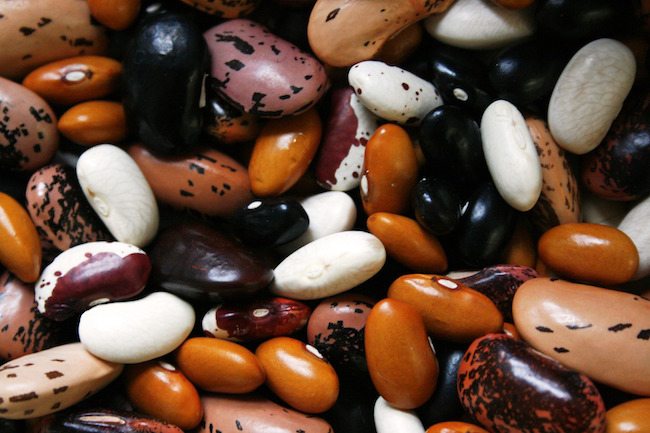With 2016 being declared the International Year of Pulses by the United Nations, you’ve probably been hearing more about them lately, and you may even be wondering what pulses are! They are more commonly referred to as legumes. Pulses include beans and peas that are harvested when they are dry (think chickpeas, kidney beans, lentils, etc.!). These little guys are really nutritious and are full of fibre, iron, protein and other vitamins and minerals that support good health. So, the message seems obvious; eat more beans and peas for good health, right? This may be the case for some, but for others, it’s not that simple. Many people have trouble digesting pulses, particularly those with IBS, and oftentimes end up with the tell-tale symptoms of digestive distress – gas, bloating and abdominal pain. So if you are part of the latter group, what can you do to get the health benefits of beans and peas without the uncomfortable symptoms? Keep reading to find out!
Why is it Hard to Digest Beans and Peas?
The reason why it is harder for some people to digest pulses is actually related to the reason why many beans and peas are eliminated in the low FODMAP diet. Beans and peas contain a variety of carbohydrates called oligosaccharides, which are types of sugar that are poorly absorbed by the body; they require a certain enzyme called alpha-galactosidase to help break them down so they can get absorbed.
Imagine there is a long chain of handcuffs interlocked together and it’s your job to unlink each set and put them away. The long chain of handcuffs represents a chain of oligosaccharides. Because they are all locked, you can’t just pull them apart, you need to find the key to release each one. Alpha-galactosidase works like a key to “unlock” or break apart these oligosaccharides. The smaller individual sugars can then be absorbed through the intestines into the body. Alpha-galactosidase is produced by the salivary glands in the mouth and also by the pancreas. Some people don’t produce enough of this enzyme, leaving the sugar undigested and available in the intestines for bacteria to use. The bacteria consume the oligosaccharides and release gas – causing bloating, flatulence and abdominal pain.
This process is very similar to what happens with lactose in people who are lactose intolerant. Think you may be lactose intolerant? Learn more about it in our article Digestive Enzymes and IBS: Lactose Intolerance.
Beans and IBS
Many people with IBS report symptoms of digestive distress after eating pulses. This is likely due to not producing enough alpha-galactosidase enzyme, but also could be related to a number of other factors including what they were eaten with, when, and their fibre content. Many people with IBS have difficulty digesting very fibrous foods!
The low FODMAP diet is an excellent way to determine whether beans and peas are a trigger for unpleasant symptoms. During the reintroduction phase of the diet, you can determine how your body responds to them.
The first step if you’re looking to improve irritable bowel syndrome (IBS) or another digestive disorder or disease, is to understand more about the Low FODMAP diet and if it can help. Download my free eBook to help you better understand this diet and get started implementing simple steps to get rid of symptoms like gas, bloating, pain, diarrhea or constipation related to IBS. Click here to get a copy emailed to you right away.
Using Enzymes to Treat Gas
You’ve probably heard about the supplement Beano. Beano is just one of the many digestive supplements containing alpha-galactosidase intended to help the digestion of pulses. So what do we know about the effectiveness of these products?
Unfortunately, there are very few studies testing alpha-galactosidase. This means we can’t say for sure whether supplements containing this digestive enzyme really work or not. The good news is that the existing studies show some promise. Studies conducted on children and adults indicate that many of the participants experienced less flatulence, and some found their overall symptoms (like bloating, cramping, etc.) less severe. It’s important to note that studies were conducted on healthy participants, so we don’t know if supplementing this enzyme is helpful for those with IBS.
What’s the bottom line? At this time, we do not have enough research to recommend using an alpha-galactosidase supplement, especially for those suffering from IBS. If you are really eager to try it, talk to your pharmacist first and know that it may not work for you.
Thankfully there are a couple pulses that at smaller quantities are easy to digest! Canned lentils (less than ½ cup per serving) and canned chickpeas (less than ¼ cup per serving) are delicious, versatile pulses that pack a nutritional punch without feeling like you are being inflated.
Photo credits: Monash University Low FODMAP App
If you’re looking for support and more information to help you with the Low FODMAP diet, read more about the CLAIRITY Program. This is the best way to work with me in the program I offer to meet you where you are, provide you with credible, up-to-date advice and information to get you feeling better and get back to enjoying your life. I’d love to have you join us as a member.
Although the lack of alpha-galactosidase enzyme may be responsible for some of your IBS symptoms, there are many other factors that cause digestive symptoms. If you and your doctor have come to the conclusion that your symptoms are caused by IBS, I recommend seeing a dietitian because everyone’s body is different. A dietitian can put the best scientific evidence available into practice to coach you through the low FODMAP diet and help you get relief.
Wishing you good gut health & wellness,
Stephanie (article written by Sam Penlington)
Sources Used
Di Stefano M, Miceli E, Gotti S, Missanelli A, Mazzocchi S, Corazza GR. The Effect of Oral α-Galactosidase on Intestinal Gas Production and Gas-Related Symptoms. Digestive Diseases and Sciences. 2007;52(1):78-83.
Di Nardo G, Oliva S, Ferrari F, Mallardo S, Barbara G, Cremon C, et al. Efficacy and tolerability of α-galactosidase in treating gas-related symptoms in children: a randomized, double-blind, placebo controlled trial. BMC gastroenterology. 2013;13(1):142-148.


